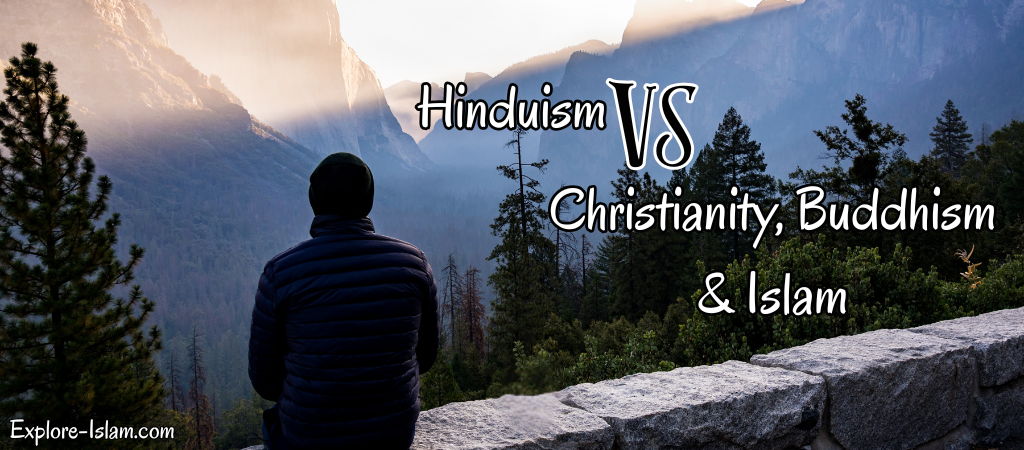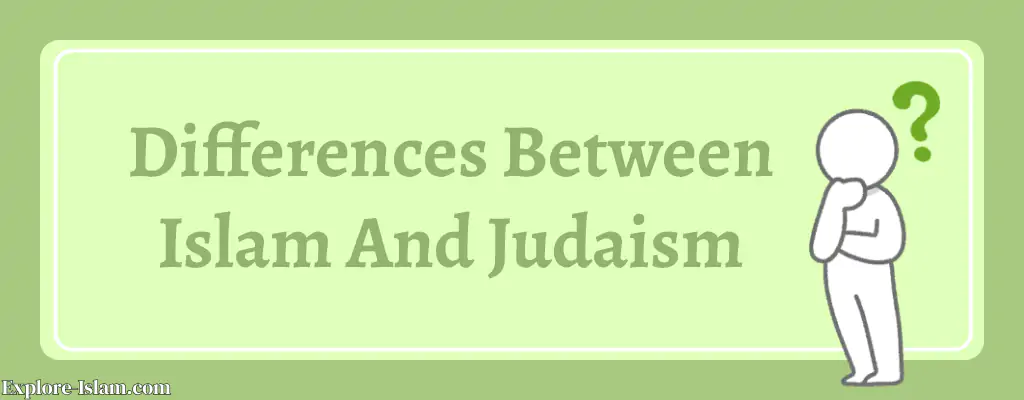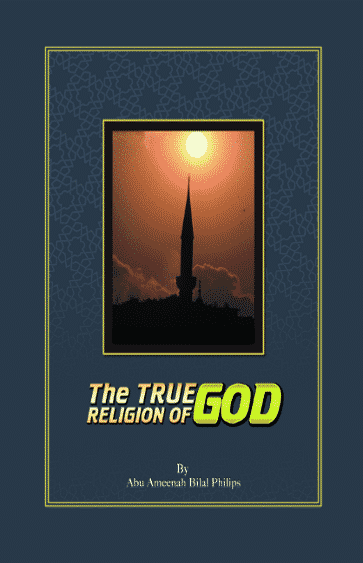What is different about Hinduism compared to Christianity, Buddhism, and Islam? Imagine standing at a crossroads, each path representing one of the world’s major religions. On one side, there’s Hinduism and Buddhism—man-made, ancient traditions rooted in human philosophy and spiritual practices. On the other, Christianity and Islam—originally divine messages, though one strayed from its monotheistic roots over time. But which path leads to the ultimate truth?
This article explores the origins, core beliefs, and guiding principles of Hinduism, Buddhism, Christianity, and Islam, highlighting why Islam remains the only divinely preserved source of comprehensive guidance for humanity.
Ready to uncover what sets Islam apart as the final, uncorrupted, and universally applicable path of truth? Let’s begin.
What Is Different About Hinduism Compared To Christianity Buddhism And Islam
The main difference between Hinduism and each of Christianity, Buddhism, and Islam lies in its origin and concept of the divine. Hinduism is a man-made, polytheistic tradition deeply tied to culture and regional heritage, lacking a clear and unified view of God.
In contrast, Christianity began as a divine message that eventually changed and adopted polytheistic elements like the Trinity, while Buddhism altogether dismisses the idea of a creator god, focusing on self-enlightenment.
Islam, however, stands apart as a monotheistic faith with a preserved divine origin, offering a complete and universal system grounded in the belief in one Almighty God who governs all aspects of life.
The following is a table summarizing the key aspects of the discussed religions:
| Religion | Origin | View of God | Core Beliefs/Teachings | Scripture | Salvation Concept | Eligibility to Manage Life |
| Hinduism | Ancient India | Polytheistic and man-made | Karma, Dharma, Moksha, Spiritual Traditions | Vedas, four parts developed over time | Liberation (Moksha) through devotion, knowledge | Unclear concept of God. – Polytheistic confusion. – Negative depiction of deities. – Lack of clear moral guidelines |
| Buddhism | India | No creator god | Middle Way, Nirvana, Enlightenment | Buddha’s texts | Achieving Nirvana through self-enlightenment | No god or clear concept of God, limited human-made origin, lacks a comprehensive system |
| Christianity | Jerusalem | Trinitarian (Three in One) | Salvation through Jesus’ sacrifice, Love of God | Bible (Old and New Testaments) | Salvation through Jesus, no solid actions required | Corrupted scriptures, unclear laws, subjective salvation |
| Islam | Mecca in Arabic Peninsula | Monotheistic, one Almighty God | Five Pillars of Islam, Six Articles of Faith | Quran (Preserved and Authentic forever) | Accountability, repentance, and God’s mercy and Love | Comprehensive and preserved system for all aspects of life, suitable for all people and times forever, presented by the All-Loving and All-Knowing One God. |
Hinduism: Main Beliefs and Reasons Behind Ineligibility
Hinduism is the third-largest religion globally, with approximately one billion adherents, predominantly in India but also present worldwide. Since Hinduism is mainly centered in the highly populated country of India, its primary factor of continuity is the intertwining of tradition and culture with religion—a natural human inclination.
Although Hinduism lacks a solid system of principles to manage life, it offers multiple paths to spiritual liberation instead. It consists of mere spiritual traditions supported by the collective customs of a large society. Also, Hinduism spread to other regions through media within an atmosphere of spiritual attraction, especially among those whose religions have become void of spiritual fulfillment, a fundamental human need.
Hindu View of God:
Hinduism’s belief in God is predominantly polytheistic and man-made. Though centered on Brahman, the alleged eternal origin of existence, it has the concept of a trinity composed of Brahma, Vishnu, and Shiva—an idea that was later borrowed by Christianity in its three-in-one concept.
Core Beliefs in Hinduism:
Several concepts govern Hinduism and shape its followers’ mindsets:
- Karma: The principle that every action—positive or negative—impacts one’s future, either in the current life or in subsequent reincarnations.
- Dharma: The duty to fulfill one’s societal role without attachment to outcomes.
Holy Text of Hinduism:
As a man-made religion, Hinduism lacks a single authoritative scripture. However, the most significant text for Hindus is the Veda, which consists of four parts and has developed over time. It provides no solid, systematic rules but rather nurtures the faith of followers through spiritual practices and objectives.
Way of Salvation in Hinduism:
Hinduism suggests salvation through Moksha—a concept referring to liberation from the eternal cycle of life, death, and rebirth. This objective can be achieved through devotion, spiritual knowledge, and meditation.
Is Hinduism Eligible to Manage Human Life?
Hinduism lacks the objective qualifications to manage human life for the following reasons:
- Unclear Concept of God: In Hinduism, there is no clear understanding of a singular, controlling deity that governs the world. Instead, everything is considered a manifestation of god, leading to a vague definition of the Creator, which affects one’s lifestyle and relationship with the divine.
- Polytheistic Confusion: The polytheistic nature of Hinduism leads to confusion and discord, as multiple deities raise questions about which deity to follow, who is more qualified, and based on what criteria.
- Negative Depiction of Deities: Hindu deities often exhibit morally questionable behavior, which contradicts the concept of divine role models. For instance, Vishnu is said to have committed acts of sexual assault (Shiva Purana 5.4.17), and similar actions are attributed to other Hindu gods in Devi Bhagavatam 2.6.13-35 and Brahma Purana 4.42-43.
- Lack of Clear Moral Guidelines: In texts such as the Shiva Purana, immoral acts are not clearly condemned. Additionally, there are no direct rules outlining the standards of right and wrong, making the moral framework subjective and unstable.
Thus, Hinduism is a man-made religion characterized by a polytheistic view of god, an unclear system for managing life, and a subjective moral framework that fosters confusion and discord, thereby making it unsuitable as a comprehensive path of guidance on earth.
Following is a table summarizing hindu main ideas:
| Section | Main Ideas |
| Introduction | Hinduism is the third-largest religion, predominantly in India. It intertwines tradition and culture with religion, offering spiritual paths without a solid life management system. |
| Hindu View of God | Hinduism is primarily polytheistic, centering on Brahman and a trinity of Brahma, Vishnu, and Shiva, later borrowed by Christianity. |
| Core Beliefs in Hinduism | – Karma: Actions affect current and future lives. – Dharma: Fulfilling societal roles without attachment to outcomes. |
| Holy Text of Hinduism | Lacks a single authoritative scripture; Vedas are considered the main texts, offering spiritual guidance without systematic laws. |
| Way of Salvation | Salvation through Moksha, the liberation from the cycle of rebirth, achieved via devotion, knowledge, and meditation. |
| Ineligibility to Manage Life | – Unclear concept of God. – Polytheistic confusion. – Negative depiction of deities. – Lack of clear moral guidelines. |
Read also: Which Religion Came First In The World?
Christianity: Main Beliefs and Reasons Behind Ineligibility
Though Christianity originated from the divine message of the Bible and a monotheistic view of God, it has evolved over time into a polytheistic belief system with the loss of the original scriptures and subsequent alterations by later generations. Only scattered pieces of truth remain in the Bible to guide truth-seekers to the final preserved revelation of God—the Quran.
Christian View of God:
Though the Bible refers to one God in many parts, as Jesus said:
“The most important one,” answered Jesus, “is this: ‘Hear, O Israel: The Lord our God, the Lord is one.’”
(Mark 12:29).
The polytheistic nature of the Trinity—a three-in-one god—was introduced later, borrowing the concept from Hindu man-made beliefs that depict God in human form and attributes.
Holy Text of Christianity:
Christians believe in the Old and New Testaments, including the Gospels of John, Matthew, Luke, and Mark as their holy texts.
Way of Salvation in Christianity:
Christianity essentially promises salvation to all its followers without a clear effort required. Instead, it teaches that Almighty God sacrificed His ‘son’—God forbid—for the salvation of others. Any other instructions regarding salvation are considered marginal.
Is Christianity Eligible to Manage Human Life?
Christianity is ineligible to manage human life for the following reasons:
- Questioned Preservation of Scripture: Christians admit that the original Bible, known as the ‘Q source,’ is lost. The four gospels were written by unknown authors with unverified accounts following the time of Prophet Jesus (pbuh).
- Unclear Depiction of God: Although Christians promote the idea of a loving God, the concept of crucifixion contradicts this notion. How can it be justice, compassion, or love to sacrifice an innocent one for the sins of others?
- Lack of Comprehensive Rules: Christianity does not provide a clear system of rules for social, economic, political, or spiritual aspects of life, leaving a gap in guiding human interactions with the Creator, society, and oneself.
- Absence of a Solid Accountability System: The idea of salvation fosters societal corruption, as it guarantees forgiveness without a structured system of accountability or guidelines for self-reformation in this life or the hereafter.
Thus, the original teachings of Jesus were part of a series of divine messages suitable for specific times and people, but they ultimately became corrupted, followed by the final preserved and universal message of Islam.
| Section | Main Ideas |
| Introduction | Christianity originally began as a monotheistic religion but evolved into a polytheistic belief system due to alterations and loss of original scriptures, retaining only fragments of truth in the Bible. |
| Christian View of God | The Bible refers to one God, as stated by Jesus in Mark 12:29. However, the Trinity concept—three-in-one—is a later insertion, borrowed from Hinduism. |
| Holy Text of Christianity | Christians consider the Old and New Testaments, including the Gospels of John, Matthew, Luke, and Mark, as holy texts. |
| Way of Salvation | Christianity teaches that salvation is granted through the sacrifice of God’s ‘son,’ with minimal effort required, undermining accountability and self-reformation. |
| Ineligibility to Manage Life | – Questionable preservation of scripture, as the original ‘Gospel Q’ is lost. – Unclear depiction of God, contradicting the notion of a loving deity. – Lack of comprehensive rules governing life. – Absence of a structured accountability system, fostering moral laxity. |
Read more:
- Christianity And Islam Similarities
- Top 15 Differences Between Islam And Christianity
- Similarities And Differences In The Spread Of Islam And Christianity
- Did Islam Come from Christianity?
Buddhism: Main Beliefs and Reasons Behind Ineligibility
Buddhism is a non-theistic, man-made, fourth-largest world religion with nearly half a billion followers, primarily in East, Southeast, and South Asia.
- View of God: Buddhism does not acknowledge the existence of a creator god.
- Core Beliefs of Buddhism: Buddhism teaches that life is characterized by suffering caused by desire—a state that can be resolved by following the “Middle Way,” a balanced path between extreme asceticism and indulgence.
- Spiritual Goal: The main objective in Buddhism is to free oneself from desires, achieve enlightenment, and attain inner peace through the ascetic teachings of Buddha and meditation. The ultimate goal is to reach Nirvana, a state of liberation and freedom from desire.
Is Buddhism Eligible for Managing Human Life?
Buddhism is considered ineligible as a comprehensive system for managing life for the following reasons:
- Limited Human Founder: Buddha, the founder, was a limited human being, unable to provide answers to all existential questions due to human limitations in knowledge, experience, and qualities.
- Absence of a Creator Concept: Buddhism lacks a clear understanding of the identity or existence of a creator. How can the world and its organized systems exist without an all-wise, ever-living, and all-knowing Creator?
- Vague Concept of Self-Enlightenment: Buddhism’s teachings emphasize self-reformation and inner peace, but they lack a concrete framework for accountability or consequences for not adhering to these teachings. As a result, consider, for example, the massacres committed by Buddhists in Myanmar against Muslim Rohingya as partially documented by Human Rights Watch and other news agencies.
To sum up, Buddhism is a non-theistic religion that reflects human limitations in providing ultimate guidance about life and the afterlife.
Islam: The Final Universal and Ultimate Preserved Divine Guidance
Islam is the final divine message from the Almighty One God to humanity, promised to be preserved as the ultimate guidance in all aspects of life, suitable for all people and times until the end.
Due to its simplicity and alignment with human common sense, Islam is the fastest-growing religion according to Pew Research.
View of God in Islam:
Islam presents a noble and unique perspective on the Almighty God as a uni-personal, singular deity with supreme attributes that balance love and fear, urging people to lead righteous lives. Almighty God introduces Himself to His creation in the final preserved divine book, the Quran (translated):
“Allah! There is no god ˹worthy of worship˺ except Him, the Ever-Living, All-Sustaining. Neither drowsiness nor sleep overtakes Him. To Him belongs whatever is in the heavens and whatever is on the earth. Who could possibly intercede with Him without His permission? He ˹fully˺ knows what is ahead of them and what is behind them, but no one can grasp any of His knowledge—except what He wills ˹to reveal˺. His Seat encompasses the heavens and the earth, and the preservation of both does not tire Him. For He is the Most High, the Greatest.”
Read more about God in Islam:
Core Beliefs of Islam:
Islam is a monotheistic religion founded on submission to Almighty God, structured around a clear system of pillars and beliefs known as the Five Pillars of Islam and the Six Articles of Faith. For more about these beliefs and other Islamic concepts in brief, refer to this article: What Is Islam Religion?
Islamic Holy Book:
The Quran is the noble scripture of Islam, revealed by Almighty God and promised to be preserved until the end of life. It serves as ultimate guidance to humanity, encompassing a clear introduction to Almighty God and a comprehensive system of life, supported by the authentic sayings of Prophet Muhammad (pbuh).
Read more:
- Has The Quran Changed?
- What Do Muslims Believe About the Quran?
- How Many versions of the Quran are there?
- What Is The Difference Between The Bible And The Quran?
Islamic Way of Salvation:
Islam outlines a clear path of salvation based on belief in one God and the accountability of individuals for their actions, which they will be judged for in the afterlife:
“So whoever does an atom’s weight of good will see it. And whoever does an atom’s weight of evil will see it.”
Still, there is a path of forgiveness from the All-Loving God for those who sincerely repent after committing sins.
Read more about salvation and repentance in Islam:
Why Is Islam the Ultimate Truth?
Islam is the only divine truth preserved until today for the following reasons:
- Preserved Scripture: The Quran remains the only preserved divine scripture, serving as a miraculous guide for humanity. As stated in the Quran: “Indeed, it is We [God, plural form for majesty] who sent down the message [i.e., the Qur’ān], and indeed, We will be its guardian.” (Quran 15:9)
- Comprehensive System Meeting Human Needs: Islam provides a complete system governing all aspects of life—spiritual, social, economic, and political—coming from the All-Knowing God, ensuring self-reformation and ultimate guidance in both this life and the hereafter.
Read more:
- Who Is The Real & True God In The World?
- 8 Reasons Why You Should Be a Muslim?
- The Spread Of Islam
- Why Do Western Women Convert to Islam?
Conclusion: Why Are There So Many Religions?
To conclude, we examined the core beliefs, views on God, and the eligibility of four major religions — Hinduism, Buddhism, Christianity, and Islam — based on a unified set of criteria. While Hinduism, Buddhism, and Christianity present varied perspectives rooted in polytheism, lack preservation and a comprehensive guiding system, or have vague concepts of the Almighty God, Islam stands out as the final, divinely preserved guidance from the One Almighty God, offering a comprehensive, all-encompassing system for managing life.
Islam’s narrative on the origin and deviation of belief in one God is clearly stated in the following prophetic saying:
“I have created My servants as one having a natural inclination to the worship of Allah but it is Satan who turns them away from the right religion and he makes unlawful what has been declared lawful for them and he commands them to ascribe partnership with Me, although he has no justification for that.”
Curious to learn more about why Islam is the only preserved truth on earth today? Connect with our team for deeper insights and discussions!








